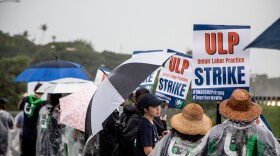The U.S. Environmental Protection Agency says efforts to remove hazardous waste in Lāhainā are about 70% complete.
Many of the hundreds of destroyed structures were residential and contained toxic materials like lead and asbestos.
Across the country, communities are engaged in this kind of cleanup in the wake of hurricanes, fires and floods.

A new investigation from the Center for Public Integrity and Columbia Journalism Investigations shows that workers involved in disaster cleanup often lack protections to keep them safe.
The series titled "Toxic Labor" surveyed 100 people who had worked in disaster recovery, mainly in Florida and Louisiana.
Many of those workers reported being exposed to harmful substances like lead, mold, and asbestos. Several also reported health issues related to that exposure.
María Inés Zamudio, an investigative reporter with the center, says federal organizations like the Occupational Safety and Health Administration have largely failed to put protections in place for these workers.
"In the reporting process, we realized that this industry is fueled by undocumented labor. Immigrants from Latin America and the Caribbean, who have fled poverty, violence, and even natural disasters in their own home country are doing a lot of this work," she said.
"Many of these workers unwittingly are exposed to these toxins and often have no protection. So a lot of the workers that we spoke with, a lot of them didn't understand what they were being exposed to."
The researchers hope their investigation will bring awareness to the often-overlooked, loosely regulated industry.
"We know that as we continue to experience climate-driven catastrophes like flash floods, hurricanes and wildfires, we expect that this industry will continue to grow across the country," she told HPR.
Further reading: "Toxic Labor" by Janelle Retka, Samantha McCabe, Jiahui Huang and María Inés Zamudio
This interview aired on The Conversation on Oct. 10, 2023. The Conversation airs weekdays at 11 a.m. on HPR-1.





